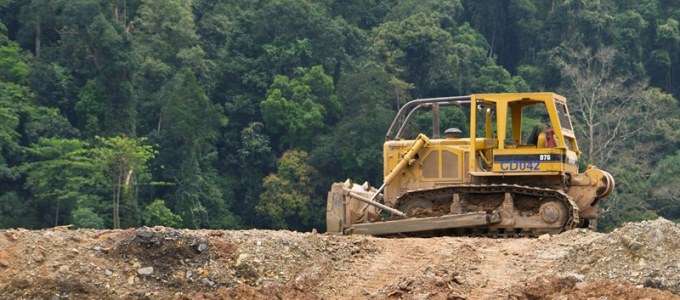Launched in Jakarta by H.E. Dr. Siti Nurbaya Bakar, Minister of Environment and Forestry, Republic of Indonesia - the study provides a valuation of the multiple benefits provided by forests in Indonesia.
Achim Steiner, UN Under-Secretary-General and Executive Director of the UN Environment Programme (UNEP), said, "In addition to their ecological, cultural and spiritual value, forests play a critical role in sustaining national economies and supporting livelihoods through the ecosystem services and employment opportunities they provide."
"Indonesia's tropical forests, the third largest in the world, not only play a significant role in climate change mitigation nationally and globally, but also support the country's transition towards a green economy. With more than 74 per cent of the poor depending on ecosystem services for their basic livelihoods, depletion of these services could be detrimental to the well-being of the poor and the country's overall growth."
"While implementing green economy strategies requires initial investment, the benefits far outweigh the costs. REDD+, in particular, has the potential to deliver the necessary investment to build synergies between economic development and forest conservation," he added.
Dr. Nur Masripatin, Director-General for Climate Change Control, speaking on behalf of the Minister of Environment and Forestry, expressed that "it is our hope that the results of this study will help Indonesia to achieve its green goals, through REDD+ implementation, by increasing awareness among politicians, at the national and subnational level, and internalizing green economy principles in our development".
At a provincial level, forests are important as a resource for clean water as well as their ability to store nutrients which provide significant value to local economies.
Led by Pavan Sukhdev as the Study Leader, the study emphasizes the urgent need for the government to find alternative ways of conserving forests while simultaneously protecting the livelihoods of people dependent on forest services.
One of the ways of achieving this is through community management of forest resources, whilst concomitantly improving existing approaches of ecosystem services payments, as these have been shown to be of significant value.
REDD+, as a payment for environmental services scheme, could play an important role by providing an alternative source of income whilst allowing forests to recover biomass and thus, improve their ability to deliver ecosystem services to the poor while laying the foundation for alternative financial resources.
The government of Indonesia is increasingly recognizing customary rights to forestlands, which not only is a way to help conserve and maintain forests, but also is an effective mechanism for poverty reduction and equitable development. Fair and good governance in the forest sector promotes social justice as it helps protect the customary rights, cultures and religions of the indigenous communities dependent on these forests, and also fosters a sense of community coherence and stable democratic political environment.
Mr. Pavan Sukhdev, UNEP Goodwill Ambassador and Study Leader, underlined that "We need to recognize that nature is a foundation stone of our economy, whether we are talking about food security, livelihoods, climate change, water provision, employment or health. Without ecological foundation stones nothing works."
Ecosystem services are the largest component of household income of the poor, and if you lose them we damage the GDP of the poor. Key results from the studies in Kenya, Tanzania and Panama have shown that the costs of deforestation are much higher than the benefits of deforestation. Public costs are much more visible, than private benefits: we need to make visible the costs of losing ecosystem services. We need to build from these studies, and create schemes and policies that ensure that ecosystem services are valued", he added
The Study underlines that at a national and provincial level, forestry remains a key sector in terms of employment in remote areas, but also in its important contribution to other branches of the economy. For instance, the study estimates the water recharge capacity of forested areas in East Nusa Tengarra, and the significant role it plays in sustaining agricultural yields, and hence employment. Bearing in mind 80 per cent of the province is involved in the agricultural sector, the report highlights the importance that forests play in promoting these other significant sectors of the economy.
The ultimate aim of the Forest Ecosystem Valuation Study, which has also been undertaken in Kenya, Tanzania, Panama, and Gabon by UNEP, is to assess and analyze quantitative evidence of the opportunities presented by investments in sustainable management of forest ecosystems.
Mr. Satya Tripathi, Director of UNORCID, said "the purpose of this report is not to be filed away as an academic publication, but to inspire and inform people working to bring about practical change to 'business as usual' economic development. Across Indonesia, the costs of depleting the country's rich ecosystems not only damage long-term prospects of economic growth, but also widen economic inequality, increase vulnerability to climate change and severely constrain prospects for rural poverty alleviation."
"Quantitative evidence of ecosystem value can be used to support policy development and implementation to drive a green economy transition, including: the creation of new jobs in sustainable sectors, identification of green industrial activities, and the design of new and innovative economic development strategies that have natural capital valuation at their heart", he added
The FEVS for Indonesia should be considered as a first step toward a more thorough understanding of the role of forest ecosystem services in Indonesia. More importantly, it lays the foundation for further research and assessment of key socio-economic trends driving forest cover change, as well as the impact of climate change on the future capacity of forests to continue to provide vital ecosystem services, both from a quantitative and qualitative point of view.
Source: UNEP News Centre | 08 July 2015














